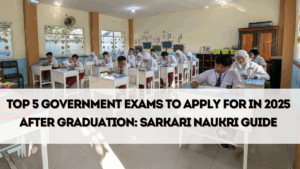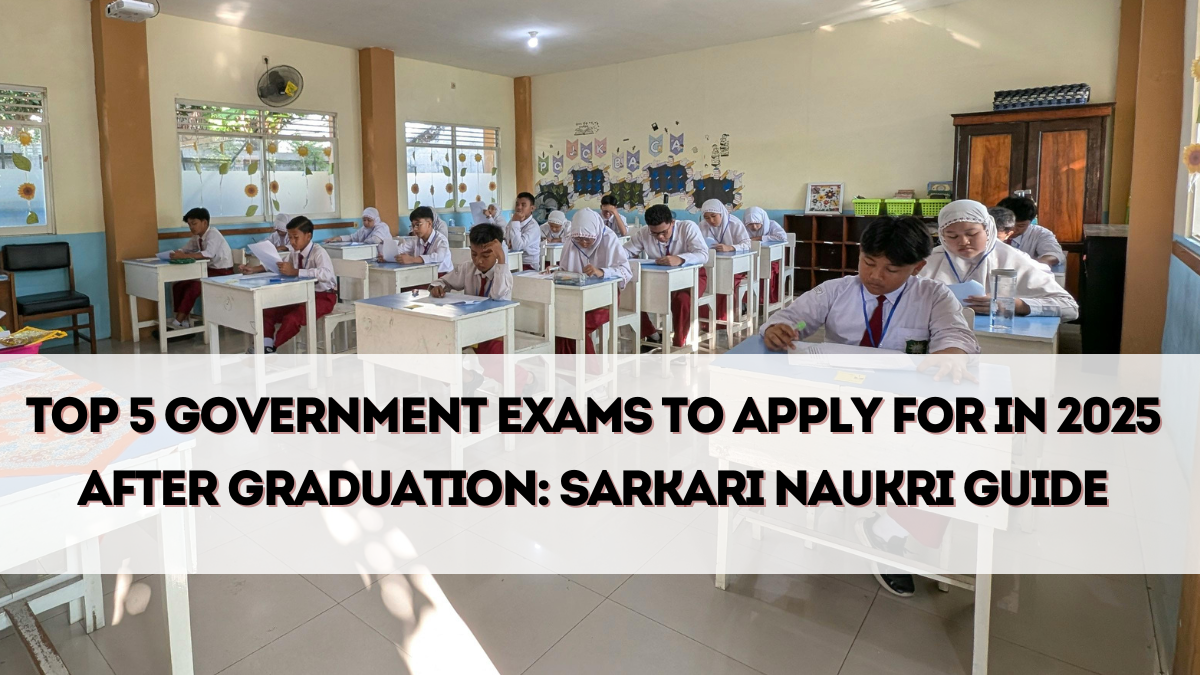In India, government jobs remain one of the most secure and respected career options. Every year, lakhs of graduates appear for competitive exams hoping to secure positions in administration, banking, defense, or other public sectors. With new reforms and recruitment notifications, 2025 is set to be another big year for aspirants. For graduates seeking opportunities, knowing the Top 5 Government Exams to Apply for After Graduation in 2025 is essential to plan preparation and applications in time.

Why Government Exams After Graduation Are Popular
There are several reasons why graduates continue to choose government jobs despite rising private sector opportunities:
-
Job Security: Government jobs guarantee stability compared to private roles.
-
Attractive Salary Packages: Many exams open the door to well-paying careers.
-
Perks and Benefits: Housing allowances, pension plans, and medical coverage are included.
-
Prestige and Social Status: Positions like IAS or RBI officer carry immense respect.
-
Work-Life Balance: Most government jobs maintain predictable work hours.
This mix of financial, social, and professional benefits ensures these exams remain in high demand.
Top 5 Government Exams After Graduation in 2025
Here’s the list of the most important government exams for graduates this year:
1. UPSC Civil Services Examination (CSE)
-
Conducted by: Union Public Service Commission (UPSC)
-
Posts Offered: IAS, IPS, IFS, IRS, and other Group A and B services.
-
Exam Stages: Prelims, Mains, and Personality Test (Interview).
-
Why It’s Popular: Considered the most prestigious exam, offering opportunities to serve in top administrative positions.
-
Timeline 2025: Prelims in May/June, Mains in September, Interviews in early 2026.
2. SSC Combined Graduate Level Examination (CGL)
-
Conducted by: Staff Selection Commission (SSC)
-
Posts Offered: Inspectors, Assistants, Auditors, Tax Officers, etc.
-
Exam Stages: Tier I, Tier II, Tier III (Descriptive), and Tier IV (Skill Test).
-
Why It’s Popular: Offers diverse job roles with central government departments.
-
Timeline 2025: Tier I in June/July, followed by Tier II in October.
3. IBPS Probationary Officer (PO) Examination
-
Conducted by: Institute of Banking Personnel Selection (IBPS)
-
Posts Offered: Probationary Officers in public sector banks.
-
Exam Stages: Prelims, Mains, and Interview.
-
Why It’s Popular: Banking jobs offer excellent salary, promotion opportunities, and transferable postings.
-
Timeline 2025: Prelims in October, Mains in November, Interviews in January 2026.
4. RBI Grade B Examination
-
Conducted by: Reserve Bank of India (RBI)
-
Posts Offered: Officers in RBI’s Grade B cadre.
-
Exam Stages: Phase I, Phase II, and Interview.
-
Why It’s Popular: Highly prestigious, with lucrative pay and influence in India’s monetary system.
-
Timeline 2025: Phase I in June, Phase II in July, Interviews in September.
5. State Public Service Commission (PSC) Exams
-
Conducted by: Individual state PSCs.
-
Posts Offered: State civil services, revenue officers, police officers, and other administrative positions.
-
Exam Stages: Prelims, Mains, and Interview.
-
Why It’s Popular: Provides opportunities to serve in home states with strong local influence.
-
Timeline 2025: Varies by state but generally follows mid-year prelims and year-end mains.
These five exams dominate the aspirations of graduates aiming for government careers.
Preparation Strategy for 2025
To succeed in these exams, aspirants must adopt a structured approach:
-
Understand the Syllabus: Each exam has a different focus—UPSC emphasizes general studies, SSC emphasizes quantitative aptitude, and banking exams emphasize reasoning and current affairs.
-
Create a Study Schedule: Daily preparation with clear targets helps manage vast syllabi.
-
Use Standard Books: NCERTs, Laxmikant for polity, Ramesh Singh for economy, and banking-specific guides are essential.
-
Practice Mock Tests: Online tests simulate exam conditions and improve time management.
-
Stay Updated with Current Affairs: Reading newspapers and magazines like Yojana or Kurukshetra is critical.
-
Revise Regularly: Multiple revisions help retain information for long-term exams.
Consistency is the key to cracking these highly competitive exams.
Benefits of Clearing These Exams
Qualifying in these exams opens doors to:
-
Stable Career: Long-term job security.
-
Attractive Salary: Starting salaries ranging from ₹40,000 to ₹1,20,000 depending on the role.
-
Growth Opportunities: Promotions and postings in higher responsibilities.
-
Societal Recognition: Government officers hold high status in Indian society.
-
Nation-Building Role: Direct participation in governance and policy implementation.
This combination makes them dream jobs for many graduates.
Challenges Faced by Aspirants
Despite the benefits, aspirants face hurdles:
-
High Competition: Millions apply every year for limited seats.
-
Extensive Syllabus: Especially for UPSC and state PSC exams.
-
Long Preparation Period: Success often requires 1–2 years of dedicated study.
-
Exam Pressure: Multiple stages test both knowledge and mental endurance.
Overcoming these challenges requires persistence, discipline, and strategic planning.
The Future of Government Exams in India
By 2030, government recruitment is expected to become even more digitized, with AI-driven evaluation methods ensuring greater transparency. Online learning and coaching platforms will continue to expand, making preparation more accessible. For 2025, however, aspirants must focus on mastering the updated exam structures and building a holistic preparation strategy.
FAQs
Which government exam is considered the toughest in India?
The UPSC Civil Services Examination is widely regarded as the toughest due to its vast syllabus and multi-stage process.
Can graduates from any stream apply for these exams?
Yes, most exams like UPSC, SSC, and IBPS are open to graduates from all streams, while specialized exams may have subject-specific eligibility.
What is the age limit for these government exams?
The age limit varies—generally 21–30 years for UPSC and SSC, with relaxations for reserved categories.
Which exam offers the highest salary among the top five?
RBI Grade B offers one of the highest starting salaries, followed closely by UPSC posts.
Are state PSC exams easier than UPSC?
They are relatively less competitive than UPSC but still highly challenging due to localized competition and syllabus coverage.
Click here to know more.
